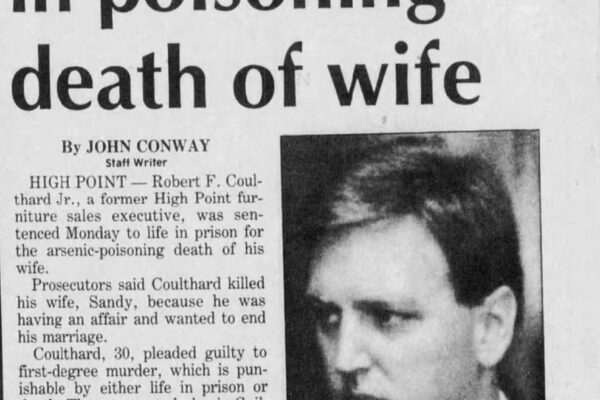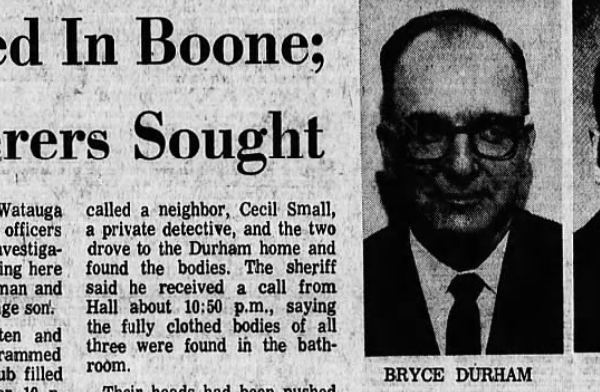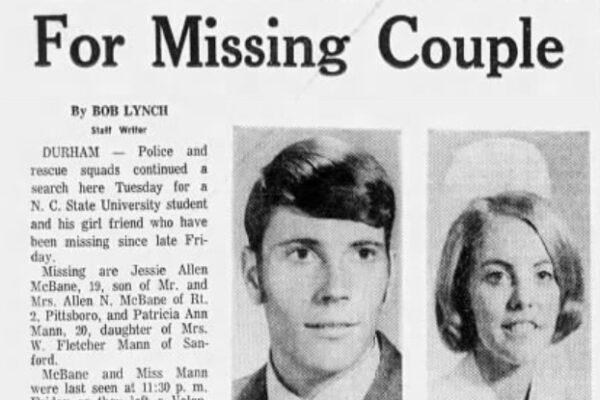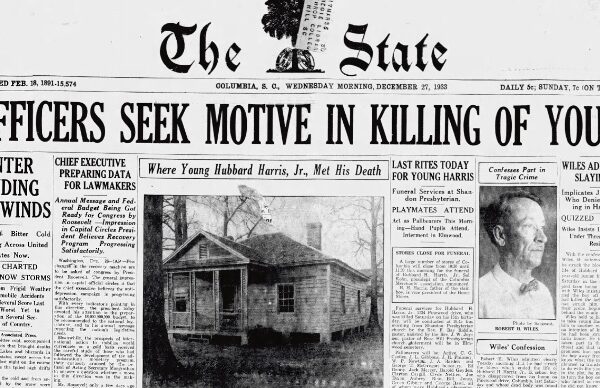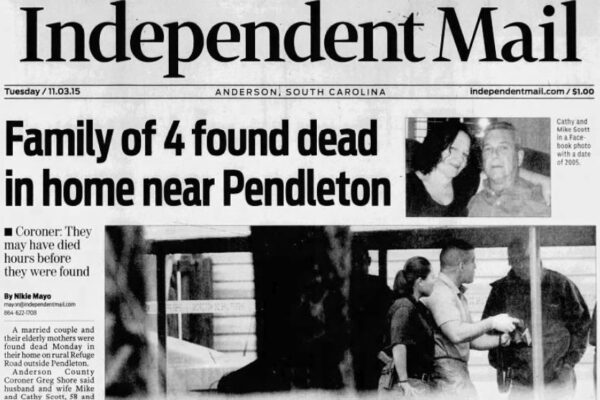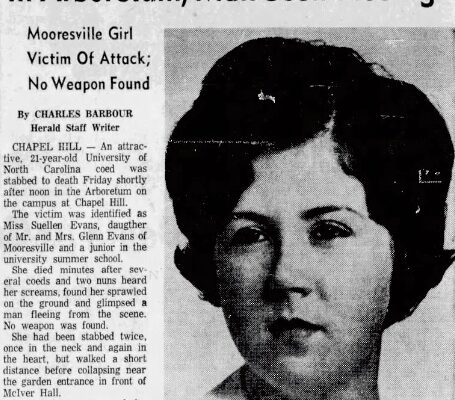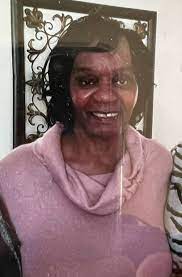This week marks National Suicide Prevention Week, which is an annual campaign designed to educate the general public about suicide prevention and the warning signs of suicide. This is a topic that resonates with so many of us. Chances are, you have a close friend or family member who has died by suicide or has had to receive counseling for their mental health.
Nathaniel and Irene Witherspoon
On January 4, 2024, residents in Franklin, North Carolina reported that a house on Prentiss Bridge Road engulfed in flames. The fire destroyed the house and two vehicles on the property. Once the fire had been extinguished by the available fire departments, firefighters found 75-year-old Nathaniel Witherspoon and 77-year-old Irene Witherspoon deceased inside. But this wasn’t just a case of two senior citizens dying as a result of a house fire.
This crime was so shocking that even local television reporters had a hard time putting it into words. Irene Witherspoon was found on the floor of the dining room and had been stabbed in the chest more than a dozen times. Chairs had been placed on top of her body. One of four knives was recovered from her many wounds. She had also been decapitated. Firefighters then discovered the deceased body of Nathaniel in a bedroom down the hall. He was lying next to a recreational cooler, and inside, investigators found his wife’s head, with leaves in the hair and inside the soft tissue of the neck. It appeared she had been murdered before the fire started.
Irene’s autopsy report stated that prior to the murder, police had received a number of domestic calls in the previous months. They did not take down reports of domestic violence, rather, Irene expressed fear of her husband that her husband would harm himself. Police eventually ruled this case a murder-suicide, but I couldn’t find any indication of what Nathaniel’s cause of death was or why they were confident in classifying it as a murder-suicide. A neighbor told WLOS-TV that she had never seen any signs of disturbance at the home, that the Witherspoons were a quiet, polite couple, and she often saw them out walking in their yard together. If I had to guess, I would say that Nathaniel Witherspoon was likely suffering from dementia when this crime occurred. My own grandfather has been diagnosed with Alzheimer’s disease, and it has caused a great deal of confusion, paranoia, and even episodes of violence. My grandmother still lives in the house with him and if it weren’t for my family members that live nearby and are helping to care for them, I would have more concerns about their safety. Unfortunately, the family of Nathaniel and Irene Witherspoon will probably never have a definitive answer as to what caused this horrible event.
Dr. Leslie and William “Allen” Cargile
On Monday, August 20, 2012, employees at FamilyCare Home, a medical practice in Black Mountain, North Carolina, became concerned when 56-year-old Dr. Leslie Cargile did not show up for work. Leslie and her husband told friends and family they were going out of town for the weekend prior to celebrate their wedding anniversary. Three days later, the state Medical Board closed FamilyCare Home in Black Mountain, along with its satellite office in Old Fort, leaving 12 to 15 employees without work and questioning what had happened to the usual reliable Dr. Leslie. She was the sole proprietor of the practice and was responsible for all executive decisions. Her husband was listed as CEO of the business and handled all the practice’s finances. Leslie had been a practicing physician for more than 25 years at that point. The Cargile’s adult sons reported their parents missing, and a spokesperson for the North Carolina Department of Health and Human Services, which oversaw the Medicaid program, said that Dr. Leslie Cargile was not being investigated and was in good standing with the program.
On August 24, 2012, employees at a Holiday Inn Express and Suites in Galveston, Texas helped solve the mystery of what had happened to the Cargiles. Management became concerned when the couple staying in Room 302 had not checked out. They had paid over a thousand dollars in cash for their room when they’d checked in on August 19. The night they checked in, they’d asked the front desk clerk to make them dinner reservations and seemed content when they returned around 9:30 p.m. They even tipped the clerk $10 for his help. Days later, front desk manager Yvonne Gisclair went to knock on the door and heard no sounds coming from the room. She unlocked the door, but it was latched from the inside. The placard hanging from the door knob had a message written on it in black marker “Do not disturb until noon Thursday. Thank you! Do not disturb please.” Gisclair asked a hotel maintenance worker to bust the latch on the door with a hammer. There, they found an unimaginable scene.
William and Leslie Cargile were on the sofa in the room, deceased. There were a variety of pills found all throughout the hotel room, a white bowl containing a brown substance, three notes, four glasses, and a nearby trash can had assorted medical items and four syringes.
Once investigators arrived on the scene they found identification in the room for the couple, including more than $800 in cash, passports, and a .357 Smith & Wesson handgun that had been reported missing from their home. Their 2006 Black Mercedes S500 was still in the parking lot outside. There were notes left behind that appeared to be recipes for different cocktails of drugs. William appeared to have been deceased longer than his wife. The medical examiner in Galveston performed the autopsies on the couple, and local police in the city took over the investigation.
The autopsy determined William Cargile had a mixture of drugs in his system that included sedatives and muscle relaxers, as well as the sleep aid, Ambien, and his cause of death was listed as multiple drug toxicity. He died one to two days before his wife. Overall, he had 12 different drugs in his blood. Leslie Cargile, had also taken a mix of prescription painkillers and sedatives.
A Timeline Revealed
Investigators were able to put together the following timeline. The couple had left their home near Hendersonville, North Carolina on August 18 and spent the night at a hotel in Mobile, Alabama. By the following night, they were at the Holiday Inn Express and Suites. They went to dinner that night and then were not seen for several days, until they missed their checkout on August 24. They had also made reservations at a hotel in Laredo, Texas but died before traveling there. The couple didn’t appear to have any ties to Galveston and weren’t known to have visited the area previously. Police helping from the Henderson County police department said the couple had left directions related to caring for their home, located on Lake Summit and valued at over a million dollars, in a note to a friend. They had also alluded to having financial problems in other notes, but did not say anything about planning their deaths. William Cargile worked as a real estate broker, investment analyst, and had more than 20 years experience building homes in Western North Carolina.
Less than a month after the couple’s deaths, Dr. Cargile’s medical practice was reopened under a new doctor who had joined the practice. The Cargiles’ oldest son, who had power of attorney, approved the move. Dr. Cargile had treated several different generations of patients in the Black Mountain and Old Fort area, and they were stunned when they learned of what had happened to their beloved doctor and her husband.
In January of 2013, police in Galveston released their final report, ruling the deaths a double suicide as a result of the strain from serious financial issues. No further information on what led to that conclusion was ever released, and the Cargiles two sons declined to speak with the media.
John Barnett
On March 9 of this year, a man named John Barnett was found deceased in his truck in the parking lot of the Holiday Inn he’d been staying at in Charleston, South Carolina. I, like many others, immediately became suspicious when I heard this news because the 62-year-old was in the middle of participating in a deposition related to a string of unsafe practices he witnessed while working as a quality control manager for Boeing.
Barnett had spent much of his career working for Boeing in both Everett, Washington and North Charleston, South Carolina. He filed his first whistleblower complaint with the company in 2017, a year before the first 737 crash, claiming that substandard manufacturing practices were being swept under the rug, potentially endangering the safety of passengers. He also filed a complaint with the Occupational Safety and Health Administration saying that Boeing retaliated against him in violation of the Employee Protection Provisions Act.
He then filed a complaint with the Federal Aviation Administration, where he again highlighted Boeing’s practices of using defective parts with minimal quality control. He retired in 2019, taking medical leave and early retirement after claiming he couldn’t handle the hostile work environment and retaliation he was receiving over his concerns for safety.
Boeing tried to dismiss Barnett’s claims, arguing he did not present facts sufficient to prove his claims. But the judge denied Boeing’s partial motion to dismiss on March 31, 2022. On Nov. 14, 2023, Barnett filed a motion to compel discovery, a move to ask the court to enforce a request for information relevant to a case. That discovery phase was set to be completed by the end of March of this year, with a formal hearing set to take place during the week of June 24.
In an interview with The New York Times in 2019, referring to a factory where Boeing aircraft were made, Barnett said: “I haven’t seen a plane out of Charleston yet that I’d put my name on saying it’s safe and airworthy.” He said the company emphasized meeting unrealistic production deadlines over safety and quality.
In the past five years, two Boeing 737 MAX aircrafts resulted in the deaths of almost 350 people. In January an Alaska Airlines Boeing 737 Max 9 suffered a door blowout shortly after take-off while flying at 16,000 feet.
Right after his death, a family friend who didn’t want to be fully identified, told ABC News Channel 4 that Barnett had told friends and family that if he died of suicide, not to believe it. This made people, including myself, wonder if he had predicted his own death.
No Signs of Distress Beforehand
Local news affiliate WPDE reported that Barnett had checked into the Holiday Inn on March 2, and began his deposition on March 7. The process was expected to take at least a month prior to the trial starting. He shared his details about the hostile working environment at Boeing on March 8, and spoke to his attorneys later that evening around 6 p.m. His attorney Robert Turkewitz, said the plan was for Barnett to continue answering questions the next day. He also told the news affiliate that he felt Barnett was in good spirits and gave no indication that he was under such stress that he was considering taking his own life, although he had been suffering from PTSD and anxiety as a result of his experience working at Boeing and speaking out against the company. Turkewitz said Barnett was looking forwarding to completing the deposition and returning back home to Louisiana to see his family.
Barnett’s attorneys tried to call him around 9 a.m. on the morning of Saturday, March 9 to confirm their appointment. When they did not hear back from him, they placed a call to the hotel for a welfare check. That’s when hotel staff discovered him deceased in his truck, a 2015 orange Dodge Ram, out in the parking lot.
During the course of their investigation, police reviewed surveillance footage from the hotel. It appeared Barnett had entered the hotel alone around 7:30 p.m., and was last seen exiting the hotel by himself around 8:37 p.m. They could then see his truck out in the parking lot backing into a parking space around 8:45 p.m., where it remained stationary until the discovery the next morning. There was never any video evidence of anyone leaving the truck after that.
Police found no signs of a physical struggle or forced entry into the vehicle. The key fob was found in Barnett’s pocket. The handgun that was discovered in his hand belonged to him, he had purchased it in 2000, and police said the trajectory of the bullet aligned with the gunshot wound to his head. Barnett had also left a notebook in the truck, and on one page he had written the statements, in bold letters, such as:
“I can’t do this any longer. Enough! F Boeing. Family, and Friends, I love you all.” He also alluded to hoping that Boeing ends up paying for the lives they’ve destroyed. He also wrote, “I found my purpose. I’m at peace. I love you more.”
Police did release images of these handwritten notes to the public. His fingerprints were found on the pages of the notebook and the outside cover. Police in Charleston, South Carolina still believe Barnett’s death to be a suicide.
In response to the news about Barnett’s death, Boeing released the following statement:
“We are saddened by Mr. Barnett’s passing, and our thoughts are with his family and friends.”
Barnett’s attorneys, Brian Knowles and Rob Turkewitz, the attorneys representing Barnett’s estate, released the following statement on May 21:
“Mr. Barnett’s last words make clear that while Boeing may not have pulled the trigger, the company is responsible for his death. Mr. Barnett’s family wishes to thank the Coroner, the responders and all those who have reached out with kind words and support. It is hoped that John’s legacy will be his brave and courageous efforts to get Boeing to change its culture of concealment to one that places quality and safety first.”
Another Boeing Whistleblower Dies
In early May of this year, Joshua Dean, a former quality auditor at Boeing supplier Spirit AeroSystems and one of the first whistleblowers to accuse leadership at Spirit of ignoring manufacturing defects on the 737 MAX, also died suddenly in Oklahoma. The 45-year-old had reportedly been in good health when he suddenly became ill and began to have trouble breathing. He was intubated, developed pneumonia, and then, the dangerous bacterial infection, MRSA. His body gave out and he died as a result of his condition. A resident of Wichita, Kansas, Dean had given a deposition in a Spirit shareholder lawsuit and filed a complaint with the FAA, alleging “serious and gross misconduct” by senior quality management of the 737 production line at Spirit.
He was represented by the same law firm in South Carolina, that had represented John Barnett. Attorney Brian Knowles said he didn’t want to speculate about the close timing and circumstances of the two deaths.”
He said instead, “Whistleblowers are needed. They bring to light wrongdoing and corruption in the interests of society. It takes a lot of courage to stand up. It’s a difficult set of circumstances. Our thoughts are now with John’s family and Josh’s family.”
Mica Miller
On April 27 of this year, a 30-year-old woman from Myrtle Beach, Mica Miller, was found deceased at the Lumber River State Park in Robeson County. Mica was a member of the Solid Rock Church in Myrtle Beach, where she led the women’s ministry and worship team. Her friends also told the media she had a passion for going on missions in places like Africa and helping others.
According to news reports, when her family members were notified of her death, which appeared to be a gunshot wound to the head, they were immediately suspicious. Mica and her husband had been involved in a contentious separation at the time of her death and many in the community questioned the circumstances under which she died.
At the time of her death, Mica was separated from her husband, John-Paul Miller, a pastor with the Solid Rock Church. She had filed reports with the local police that she was being harassed by her estranged husband. Weeks before her death, she posted a video on Facebook on the topic of abusive relationships.
In the days following her death, leadership at the church released him from his ministerial duties for what they called, “a time of healing, counsel, and guidance, pursuant to our governing instrument.” He told the media that his wife had struggled with mental health issues for years, even giving personal testimonies at the church in recorded sermons. He denied being physically or emotionally abusive with her.
The Robeson County Sheriff’s Office knew about the excessive speculation around Mica’s death, and on May 7, 2024, they released a lengthy news release with the following details about what they found during their investigation:
They said that the Robeson County 911 Communications Center had received a call at approximately 2:54 p.m. from a female. She asked the dispatcher if her phone could be located because she was going to kill herself and wanted her family to be able to find her body. This call has been released to the media. The caller hung up, but the dispatcher was able to find her location and dispatched a deputy to the scene at Lumber River State Park in Orrum, North Carolina. Deputies and park rangers conducted a search of the area, coming across a black Honda Accord with a South Carolina license plate that came back as registered to Mica Miller.
They noted a Sig Sauer gun case on the passenger seat, and a box of ammunition in the center console of the car. They also located a receipt for both purchases—they had been made that very day. Investigators made contact with a fisherman who said he found a bag near the edge of the water with identification inside that belonged to Mica. He’d also heard the sounds of a woman crying and a gunshot while he’d been fishing. Law enforcement then heard from 911 that a person had called in after finding a body in the water. The victim was identified as Mica Miller. A search of her phone later showed that she had searched “national parks near me,” and then discovered directions to the Lumber River State Park.
The Robeson County Medical Examiner, Dr. Richard Johnson, stated, “Based on the nature of the wound, that is consistent with a self-inflicted gunshot wound. And it was not in the back of the head, as it has been speculated.
Investigators looked into the whereabouts of Mica’s estranged husband, John-Paul and confirmed that he’d been out of town at an athletic event with a female romantic interest when Mica’s death occurred.
Further video surveillance showed the time that Mica left her apartment that morning (around 11 a.m.), her stop at Dick’s Pawn Shop around noon, where she purchased the ammunition and gun, a stop at a convenience store in Mullins, South Carolina around 1:30 p.m., and then the 911 call made at close to 3 p.m.
The Robeson County Sheriff’s Department concluded the statement by saying:
“This incident has garnered much attention from across the Carolinas and beyond. I want to assure everyone that a very methodical investigation was conducted by our Criminal Investigations Team and Crime Scene Investigative Team.
Unfortunately, rumors and conspiracy theories were spreading quickly, and assumptions were being made. However, in the end, we must make decisions based on the facts, and evidence that has been gathered. While I know it’s not what many people wanted to hear, the evidence is quite clear and compelling, and we are as saddened as anyone that this occurred. There are many factors that we have reviewed that occurred over an extended period of time that are probably related to the reason for this investigation, but in the end, sadly, a tragic decision was made by Mica that ended her life.”
Those who were close to Mica believe that even if her estranged husband didn’t pull the trigger, he could be responsible for her death. I personally can’t speak to what happened other than the facts, but I can see how someone living in a toxic environment for many years could be driven to take their life. I don’t think we’ll every really know what went on behind closed doors and what Mica was thinking when she drove to that state park in Lumberton. That’s how depression works, unfortunately, it’s very unpredictable.
Three months after her death, her family reached an undisclosed settlement with John-Paul Miller. His attorney, Russell B. Long, released the following statement:
Mica’s family, Pastor Miller and the Church have set their differences aside to allow Mica’s memory to live on. All parties now consider this matter closed.”
Asha Degree Update
On Episode 54, I discussed the Asha Degree missing persons case from Cleveland County, which has remained a mystery for 24 years. Nine-year-old Asha Degree went missing from her home on the night of a rainstorm, and two different witnesses reported seeing a young girl matching her description walking along Highway 18 at 4 a.m.
Earlier this week, The FBI, the North Carolina State Bureau of Investigation, and the Cleveland County Sheriff’s Office executed a search warrant on a property on Cherryville Road in Shelby. News outlet WBTV reported that on the first day of the search, investigators focused on a home and older vehicle parked in the driveway. The second day, they began to search a second residence on the same property. An older-green vehicle was towed from the home on Wednesday afternoon, September 11. In 2016, the FBI told the public they were looking for a 1970s-era green Ford Thunderbird or Lincoln, because they believed she had gotten into this vehicle the night she disappeared.
The vehicle towed was not either one of those cars, but it did resemble them. On Friday, law enforcement confirmed the raid carried out this week was related to the Asha Degree case. They said that the search warrants obtained were based on physical evidence directly connected to Asha’s disappearance. They said they did not find any human remains as part of their search.
The sheriff’s office has requested that the community does not spread rumors on social media out of respect for Asha’s family. There is still a $45,000 reward being offered for information that leads to finding Asha, who would be in her early 30s now. Anyone with information on this case can contact FBI’s Charlotte office by calling 704-672-6100.





